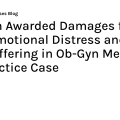Parents have grown familiar with headlines and news stories concerning issues with the country’s baby formula supply. It seems the U.S. Food and Drug Administration (FDA) announces another recall every week, and each recall is not for the same reason.
They have ranged from bacteria contamination to products being sold with hazardous levels of particular ingredients. Last month, for example, the baby formula maker, Perrigo, was forced to recall some of its products due to dangerous levels of Vitamin D.
The baby formula industry has also garnered negative attention due to baby formulas for premature infants created by two major manufacturers, Abbott Laboratories and Mead Johnson, due to the link associated with necrotizing enterocolitis (NEC), a potentially fatal gastrointestinal condition in infants, and their cow’s milk-based formulas.
NEC baby formula lawsuits filed by families whose premature infants suffered from NEC allege that the products were sold without a warning to parents and doctors of the severe danger their formulas could pose to premature babies.
Unfortunately, now there is another concern. National lawmakers may not always prioritize infant nutrition during national emergencies like the 2022 supply chain disruption.
2022: A National Baby Formula Shortage Collides with the National Supply Chain Crisis
A recent investigation by ProPublica revealed that in May 2022, officials within the Office of the United States Trade Representative (USTR) resisted lowering import tariffs on imported formula, despite the fact families were struggling to find necessary nutrition for their infants across the U.S.
At the time, Americans were grappling with COVID-19, and issues with the national supply chain were holding up the distribution of products to businesses throughout the country.
Amid the supply chain slowdown, a major baby formula production plant operated by Abbott Laboratories in Sturgis, Michigan, was shuttered after several babies became severely ill. The temporary closing of the plant happened after the FDA conducted an investigation and determined that five different strains of the dangerous bacteria, cronobacter sakazakii, were present inside the facility.
Between the supply chain clogs and the closure of one of the largest baby formula production sites in the country, federal officials found themselves struggling to keep the U.S. supply of baby formula intact.
Those at the federal level, including White House lawyers as well as members of the National Security Council, began considering bringing in baby formula from other countries and started working on a proclamation to remove import tariffs to make this possible, according to ProPublica.
However, not everyone, including several staffers in the office of the USTR, agreed with putting forth the proclamation. Because of the dairy industry’s support of the protections for U.S. manufacturers, some argued against lifting the tariff on imports, largely out of concern that it would raise “lots of questions from domestic dairy producers,” the ProPublica article reported.
On May 11, 2022, an official with the USTR emailed the National Security Council stating, “Situation at retail appears to be a combination of transportation/shipping and panic buying by consumers, not an issue of inadequate domestic production.”
In another communication, also reviewed by ProPublica, the same official told colleagues on May 12 that she discouraged the removal of tariffs, saying, “I tried to convey to NSC in very strong terms yesterday that removing tariffs from infant formula will not result in increased access to infant formula for U.S. consumers.”
The proclamation that was allegedly in the works was never released, and families continued struggling to provide nutrition to their babies. Parents and caregivers found themselves driving miles away from home in search of baby formula, and in some cases, rationing the formula to make it last.
It would not be until July 21, 2022, that the import tariffs would be temporarily lifted through Congress.
A University Looks at How the Crisis Affected Infants’ Health
Along with the August release of the ProPublica investigation, researchers through the University of California – Davis recently released a survey looking back at what occurred during the 2022 shortage. They focused primarily on the “undesirable effects” it had on babies.
Jennifer Smilowitz, an assistant professor at UC-Davis, who authored the study, was quoted in a press release concerning the results. Smilowitz said she hopes the survey will bring about changes to healthcare policies and the infant food system.
“We see there’s a systematic problem in the infant feeding supply and that is a result of a lack of lactation education and support and priority in human milk feeding,” she said. “We need to improve infants’ food supply and it starts with supporting mothers and babies.”
The survey included more than 150 parents with babies under six months old, they found a large number – 81 percent of caregivers – had to switch the type of baby formula they were using due to not having their regular formula available.
For those babies who had to change formula, 60 percent of infants experienced issues such as fussiness, gas, spit-up, constipation, and diarrhea. Babies who relied on specialty formulas due to medical conditions experienced these issues more frequently.
The study also confirmed that during the shortage, parents had to often visit multiple stores, sometimes traveling over 20 miles from home, to find a formula, and 30 percent of parents had to switch formulas three to five times during the shortage with 60 percent of the babies experiencing negative reactions with the changes.
Smilowitz stressed Americans can not ignore the challenges associated with baby nutrition. “We have so many food choices as adults; you can eat anything,” she said. “Infants have strict nutrient requirements; they can only eat two things: human milk and formula.”
Baby Formula Legal Options for Families
It is clear progress is being made in holding these powerful manufacturers accountable. For example, a decision in an NEC Baby formula lawsuit in March by a jury in Illinois resulted in a mother, whose baby contracted NEC, receiving $60 million. The jury determined Mead Johnson was negligent in warning the consumer of the risk associated with premature infants receiving their cow’s milk-based formula.
However, there are still too many concerns surrounding the baby formula industry. Manufacturers must provide safe products to consumers.
If a parent suspects that their infant has become ill due to a harmful element found in their baby’s formula, they should find a baby formula lawyer who can answer their questions on moving forward with a lawsuit and can help in recovering damages for medical bills, time spent away from work, pain and suffering, and other losses you’ve experienced.




